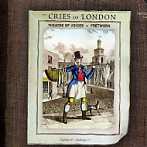Documenting the street language of vendors selling their wares in the squares and markets of 17th-century London is one thing; setting these utterances to music is another. There’s no doubt that these words and expressions are quite colorful–“New mussels, new lilywhite mussels; Perfum’d waistcoats; Hard garlic, hard; Ripe walnuts, ripe; Will you buy any ink? Buy a cover for a close-stool? Ha’ ye any rats or mice to kill?–and thus tempting for a clever composer to render with melodic and instrumental accompaniment. And not only did many composers do just that, but it became a kind of game, an entertainment, and even a teaching tool, where several different tunes and many different rhythmic devices were incorporated into the piece. The practice wasn’t limited to England either, for examples of similar compositions exist in other countries and in earlier and later centuries.
Nevertheless, the fact is that for today’s listener it’s difficult to appreciate the entertainment value of these works, whose texts essentially are just strung-together lists, the melodic lines most rudimentary–often only one note, or two or three, repeated over and over to the rhythm of the words–with continuous, contrastingly intricate instrumental accompaniment, in this case a viol consort. Paul Hillier and his singers obviously are having a great time, making their various sales-pitches with strongly-inflected gusto and offering all manner of accents, regional and local. The voices are rather close and mostly loud, and all the while the viols churn away in the background.
While there are variations in the texts and musical treatments by Gibbons, Weelkes, and Dering, if you don’t listen carefully, there’s not very much difference from one composer’s setting of “Cries” to another, and so the program suffers from sameness and from the utter simplicity/uninteresting character of the vocal material. This isn’t to say that the performances aren’t first-rate on all counts; these singers and the viol consort Fretwork are among the world’s best at what they do. And for variety the program does include a few purely instrumental pieces by Gibbons and Dering along with two songs by Michael East and Ravenscroft’s famed ballad “The Three Ravens”. But for pure listening, the disc is less effective as entertainment than it is as a curiosity or educational/reference document. In fact, I enjoyed reading the different “Cries of London” texts on their own more than I did hearing their musical settings, although, unusually for Hillier’s projects, the rather obscure, self-absorbed, even arcane liner notes are not much help in understanding the music’s context and content. (One sentence: “In his panorama of New Fashions, Cobbold used “Browning” in that way as a ground for everyday love themes…countered by the more ominous…to hint without overt moralising at the theme of sic transit.”)
In contrast to Hillier and Fretwork, there is another Cries of London recording (on Ambroisie) that covers some of the same material, sung by a group of French and English soloists but accompanied by the brass and winds of Les Sacqueboutiers. In between the settings of “Cries” (by Dering, Gibbons, and Weelkes) are excellent instrumental works by Ferrabosco, Locke, Holborne, and others. Tempos are more brisk than Hillier’s and the singing is inflected with stronger sense of rhythm. Although the sackbuts and cornetts often obscure the clarity of the words, there’s an excitement and energy in these performances that almost overcomes the boring repetitiveness and sameness mentioned above. And the more dynamic instrumental playing–helped by the colorful brass timbres–is a pleasure to hear. I’m still not a fan of the Cries of London, but if you are, one or both of these recordings should more than satisfy your interest.
































